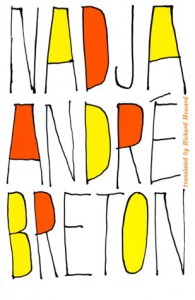Nadja

When assigning “Nadja” as the reading for next class, my professor gave us a rather cryptic warning that this book will split our class into two groups: those who loved it, and those who hated it. I didn’t find myself to be in either camp, however, as I found a little bit of both in this novel. I also, upon finishing, had no questions about why this book may elicit powerfully negative feelings from some readers. It falls into the same category as the great Russian novels or other classics, namely those books that just aren’t for everyone.
One thing I enjoyed most was the rather non-linear narrative. True, Breton does talk about how he spent his days with Nadja, at a certain point sinking into a diary-like structure where he begins with the date before proceeding with the events and musings. It’s a structure I could relate to and felt comfortable with, so the lapses in and out of the philosophical musings that would transition to ‘factual’ recollections were normal for me.
What I disliked about the book and had problems with was closely connected to this point above, mainly that at times I struggled with feeling any emotions. For surrealism is defined not by logic but by the psyche, so to approach this book with the expectation of leaving ‘enlightened’ isn’t quite the proper approach. It’s only when the emotional plane cannot be reached by the writing that surrealism becomes shaken up. Maybe it’s the specifics of the decade and Breton’s social class. Maybe I’ll get more out of it if I read “Nadja” in a few more years after developing a stronger literary base. But I wasn’t able to emotionally commit to the book in places, and I was so looking forward to doing so.
There is also a list of quotes and passages that are particularly noteworthy from this book, but I think I’ll mention this particular one, which I thought summed up it up perfectly:
About to leave her, I want to ask one question which sums up all the rest, a question which only I would ever ask, probably, but which has at least once found a reply worthy of it; ‘Who are you?” And she, without a moment’s hesitation: “I am the soul in limbo.” (p.71)
Love it or hate it, “Nadja” offers something unique to the literary world, something that is worth picking up and reading, if only to form an opinion of your own about it. Many, including myself, didn’t or still don’t know much about surrealist literature, and that should be enough of a reason to give this one a try, along with the treasure hunt for the witty and memorable bits of wisdom that are scattered throughout its pages.
 1
1





